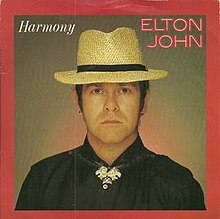Harmony (Elton John song)
| "Harmony" | |
|---|---|

UK single cover
|
|
| Single by Elton John | |
| from the album Goodbye Yellow Brick Road | |
| A-side | "Bennie and the Jets" (US) |
| B-side | "Mona Lisas and Mad Hatters" (UK) |
| Released |
|
| Recorded | 1973 at Château d'Hérouville, France |
| Genre | Rock |
| Label | |
| Writer(s) | |
| Producer(s) | Gus Dudgeon |
"Harmony" is a song written by Bernie Taupin and Elton John that was originally released by Elton John on his 1973 album Goodbye Yellow Brick Road. In the U.S. it was released as the B-side of the "Bennie and the Jets" single in 1974, and in the U.K. it was released as a single in 1980 with "Mona Lisas and Mad Hatters" on the B-side. It has also been covered by many artists, including Diana Ross, Zac Brown Band and Jesse Malin.
On their face, the lyrics of "Harmony" are addressed a lover who has returned to him after a long absence. He wonders if she only returned to him because he is the only friend she has left, but expresses his love regardless. Although the lyrics are optimistic, James Perone points out that aspects of the music, such as a modulation to a minor key suggest that the singer's happiness may only be temporary.The Elton John Scrapbook author Mary Anne Cassata interprets the song as a "two-minute forty-five second dirge of despair...that somehow soared with hope enough to make Brian Wilson proud." Elton John biographer Elizabeth J. Rosenthal interprets the song more metaphorically. Rosenthal views the song as being about John's "love affair with music." In this interpretation, John is expressing his devotion to harmony, and the "luscious" harmonies in the song are confirmation of this devotion. The drawing out of the song's last note suggest to Rosenthal that John's relationship with music will last.
Rosenthal also notes a relationship between "Harmony" and John's 1998 song "If the River Can Bend." She compares lyrics from "Harmony":
with lyrics in "If the River Can Bend" linking nautical images about a returning lover to the "harmony" the lover previously created. Rosenthal thus interprets the theme of "If the River Can Bend" as expanding on that in "Harmony" to encompass the musical partnership between John and Taupin.
...
Wikipedia
